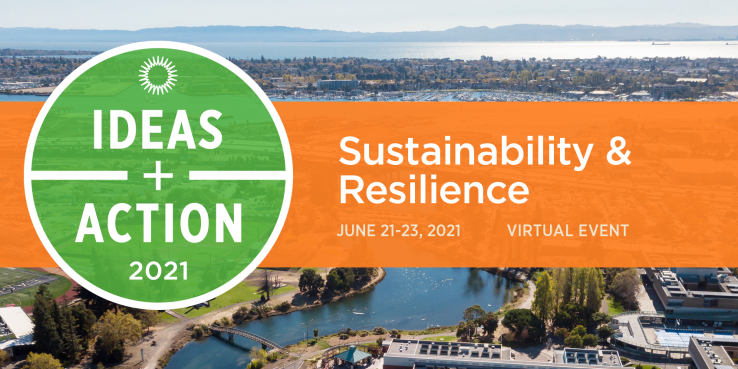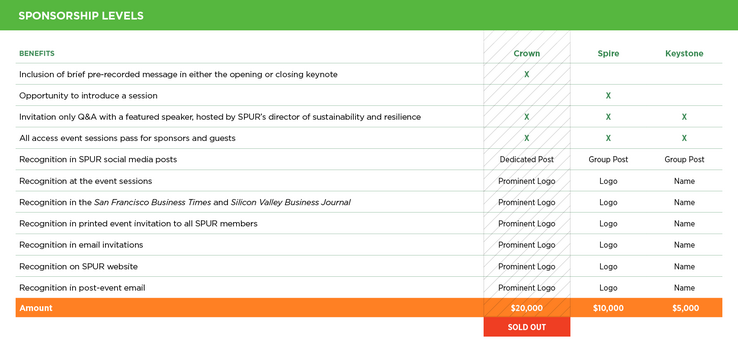MONDAY, JUNE 21 — THE PERIL
What is at stake if we don’t proactively address the escalating dangers of our changing climate?
10–11 a.m. — Opening Keynote with Dr. Robert Bullard: The Quest for Environmental and Climate Justice
Climate change is very real. In 2020, the United State alone faced 22 climate-driven disasters that each caused more than $1 billion in damages. California saw its worst fire season in modern history. The arctic experienced an unprecedented low in total sea ice. And the year capped off the hottest decade on record. Unless the world acts in unison, this new normal will continue to exacerbate, causing incalculable economic and societal ramifications. What hope do we have? Kick off Ideas + Action 2021 with a call to action on climate change with one of the originators of environmental justice about what we can do to create a sustainable and equitable future for future generations.
- Dr. Robert Bullard, often called the “father of environmental justice,” is the former Dean of the Barbara Jordan-Mickey Leland School of Public Affairs at Texas Southern University and is an award-winning author of eighteen books that address sustainable development, environmental racism, urban land use, community reinvestment and resilience, climate justice, natural disasters and regional equity. He was the founding Director of the Environmental Justice Resource Center at Clark Atlanta University and the co-founder of the HBCU Climate Change Consortium. He has been honored as one of the “13 Environmental Leaders of the Century” by Newsweek, as one of “22 Climate Trailblazers” by the Global Climate Action Summit, one of the world’s “100 Most Influential People in Climate Policy” by Apolitical and has received the Champions of the Earth Lifetime Achievement Award by the United Nations Environment Program — the UN’s highest environmental honor.
12:30–1:30 p.m. — Living on the Edge: The Future of Coastal Cities
From Miami to Lagos and London to Shanghai, some of the world’s most vibrant cities are situated on coastlines in jeopardy of being lost to sea level rise in the coming decades, putting hundreds of millions of people — many of whom live in vulnerable communities — at risk. What do we lose when these cities become inundated by rising waters, and what are the policies and technologies that should be considered to ensure we can preserve a future for everyone?
- Dr. Jennifer Jurado / Chief Resilience Officer and Director of the Environmental Planning and Community Resilience Division, Broward County, Florida
- Heather Rock / Director of Climate Resilience, PG&E
- Giselle Sebag / Global Healthy and Sustainable Cities Consultant, Bloomberg Associates
- Jainey Bavishi / Director of the Mayor's Office of Resiliency, NYC Office of the Mayor
- Allison Brooks / Executive Director, Bay Area Regional Collaborative
3–4 p.m. — The Youth Revolt
Young people have long served as outspoken activists against the ills they see in the world, but their actions have only recently transcended international borders. The widespread adoption of social media has provided youth activists with a megaphone and a worldwide audience, enabling global exposure for topics like gun control, Black Lives Matter and, perhaps most influentially, climate change. Youth-driven climate action groups have arisen in nearly every country and resourcefully use social media and other tools to influence elected leaders around the world. Hear from a panel of young climate justice leaders as they discuss what is at stake for future generations.
- Naina Agrawal-Hardin / Political and Partnerships Strategist, Sunrise Movement
- Orion Camero / Executive Director, SustainUS
- Diana Fernandez / Director of Finance, Zero Hour
- Molly Peterson / Science and Climate Reporter, KQED
5–6 p.m. — Workshop: How to Talk About Climate Change So People Listen
Timeworn advice recommends avoiding the topics of “politics”, “religion” and money in “conversation” and, in many places around the United States, “climate change” is on that list. And even though a majority of Americans now believe that the effects of climate change are real, convincing our neighbors to be proactive before disaster strikes can be a challenge. How can you or your organization talk about the climate crisis in a way that does not leave people despairing, but rather galvanized to take the big actions necessary to meaningfully address it? In this workshop, come learn the necessary skills and tactics — distilled from field experiments, evidence-based insights in social science and learnings from across the climate and clean energy advocacy community — to compellingly discuss climate change to motivate the public to take action. Limited space available!
- Rebecca Tamiru / Program Lead, Climate Advocacy Lab
TUESDAY, JUNE 22 — THE PROGRESS
How can new leadership and new ideas be harnessed to build climate resiliency?
10–11 a.m. — Woe for the WUI
Skyrocketing prices and a limited supply of homes are two of the biggest drivers that have pushed residents away from cities and further into the rural transition zones between human development and unoccupied land known as the wildland-urban interface or WUI. The natural vegetation of these areas, especially in combination with drought and inattentive land management, creates a tinderbox that can lead to catastrophic wildfires in places like the Western United States, Australia and elsewhere. What policies can be implemented to protect the tens of millions of homes that are at risk and minimize the impact of wildfire disasters?
- Ron W. Goode / Tribal Chairman, North Fork Mono Tribe
- Rhea Suh / Former President, NRDC
- Erik de Kok / Deputy Director, California Governor's Office of Planning and Research
- Abrahm Lustgarten / Senior Environmental Reporter, ProPublica
12:30–1:30 p.m. — Putting a Price on Climate Risk
Climate-related disasters have astronomical economic impacts that are felt from Main St. to Wall St. With the globe continuing to warm, we are certain to experience a greater annual concentration of these calamities — as well as ballooning price tags associated with them. How can we integrate climate science and data-driven market analysis into business decisions to reduce risks and build economic resilience in the face of a rapidly changing climate?
- Jenny Schuetz / Senior Fellow, Brookings
- Marilyn Waite / Program Officer in Environment, Hewlett Foundation
- Robert Litterman / Founding Partner, Kepos Capital
- Emilie Mazzacurati / Global Head of Climate Solutions, Moody's Corporation
- Alicia Seiger / Managing Director, Steyer-Taylor Center for Energy Policy and Finance at Stanford University
3–4 p.m. — The Next Act for Cap and Trade
California’s flagship program to reduce carbon pollution, cap and trade, has been successful at reducing greenhouse gas emissions, but it hasn’t reduced dangerous air pollution equally in all communities across the state. Can the cap and trade program become as equitable as it is efficient and be the tool that California needs to reduce emissions while maximizing benefits for low-income communities of color?
- Roger Lin / Climate and Air Counsel, California Environmental Justice Alliance
- Fran Pavley / Environmental Policy Director, USC Schwarzenegger Institute
- Derek Walker / Vice President of U.S. Climate, Environmental Defense Fund
- Laura Feinstein / Sustainability and Resilience Policy Director, SPUR
WEDNESDAY, JUNE 23 — THE PLAN
What groundbreaking tools, technologies and policies can we adopt to shape a more sustainable future?
10–11 a.m. — The Promise and Pitfalls of Capturing Carbon
Until recently, the idea of pulling carbon directly from the air seemed to be a pipe dream, but new technologies and legislation are bringing it to reality. Can advances in carbon capture prove it to be a lynchpin in a framework for our cleaner future, or is it more prudent to instead focus on reducing emissions, thus making the need for carbon capture moot? Learn more about how new practices and technologies may radically change how we think about pollution.
- Dr. Graciela Chichilnisky / Co-Founder, Global Thermostat
- Giana Amador / Founder and Policy Director, Carbon180
- Rajinder Sahota / Deputy Executive Officer of Climate Change and Research, California Air Resources Board
- Ellie Cohen / CEO, The Climate Center
12:30–2 p.m. — Workshop: Using Climate Data to Plan for California's Future
While it is impossible to predict when and where the next wildfire might spark, climate data will make it easier to understand projected climate risk and identify climate adaptation needs. Cal-Adapt, a new online climate database developed by the State of California, offers tools, data and other resources to help communities visualize and plan for how climate change might affect the state. In this interactive workshop, come explore what Cal-Adapt has to offer, learn how to use its Local Climate Snapshot tool for real-world applications and understand how you can apply this powerful resource to your own projects, including planning, development, agriculture, land preservation and much more. Limited space available!
- Leah Fisher / Senior Advisor, Strategic Growth Council
- Nancy Thomas / Executive Director, Geospatial Innovation Facility at UC Berkeley
- Lucy Andrews / Cal-Adapt Lead, Geospatial Innovation Facility at UC Berkeley
- Shruti Mukhtyar / Cal-Adapt Lead, Geospatial Innovation Facility at UC Berkeley
3–4 p.m. — Roadways to a Sustainable Future
Whether you envision the streets of our future cities as teeming with autonomous vehicles, electric cars, zero-emission transit, micro-mobility or a combination of all of the above, it’s become obvious that implementing affordable, accessible and clean transportation options for the first mile, last mile and everything in between is crucial to solving the climate crisis. But how do we accelerate towards widespread adoption of these new technologies without leaving anyone behind?
- Ellie Casson / Head of City Policy & Government Affairs, Waymo
- Susan Shaheen / Co-Director, UC Berkeley Transportation Sustainability Research Center
- Naomi Doerner / Principal and Director of Equity, Diversity, and Inclusion, Nelson\Nygaard
- Gregory Pierce / Assistant Director, UCLA Luskin Center for Innovation
- Zabe Bent / Director of Design, NACTO
5–6 p.m. — Closing Keynote with Bill McKibben
More than thirty years ago, Bill McKibben released The End of Nature, widely regarded as the first book on climate change written for a general audience. In the decades since, humanity has taken bold steps forward in shaping a more sustainable future — as well as some regretful steps backward. Where are we now in our fight against a rapidly changing climate and what should, and must, be done to shift mindsets, transform industries, influence governments and protect a recognizable future for ourselves and future generations?
- Bill McKibben is the founder of the global grassroots climate organization 350.org and serves as its advisor emeritus. He is also the Schumann Distinguished Scholar in Environmental Studies at Middlebury College and is a fellow of the American Academy of Arts and Sciences. He has written and edited 17 books, and his writing regularly appears in periodicals from the New Yorker to Rolling Stone. Among numerous awards, he has received the Gandhi Peace Prize and the Swedish Parliament’s Right Livelihood Award, as well as honorary degrees from 19 colleges and universities.



